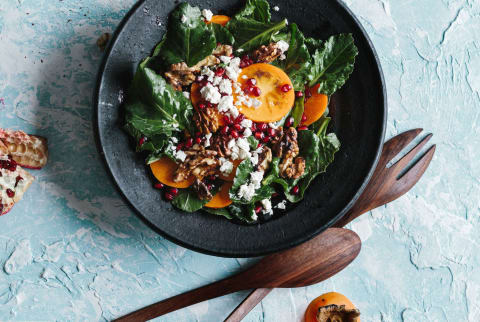Advertisement
9 Superfoods This Dietitian Keeps In Her Kitchen & Recommends To Clients



As an integrative dietitian, natural chef, and professional foodie, I talk about food all day, every day. This passion of mine wasn't exactly random—I grew up in a family of organic farmers, who taught me that living, and especially eating, in accordance with seasonality is the natural way of doing things.
While I've moved from farm life to the busy city of New York, I still cook most of my meals at home and have never downloaded a food delivery app. This lifestyle comes naturally to me due to my upbringing, but I understand that cooking nutritious meals can have its challenges. That's why, as a dietitian, I like to simplify healthy eating for my clients.
mindbodygreen Functional Nutrition Training
Learn how to use food as medicine with a cutting-edge nutrition deep dive taught by the world's foremost health & wellness experts. Learn more about mindbodygreen's Functional Nutrition Training.
The first order of business is, of course, what you're stocking your kitchen with. Here's my go-to list of superfoods that I always keep at home and recommend to every single one of my clients:
Capers
Capers are famously used in Mediterranean cuisine, and they add a ton of briny flavor (and nutrition!) to a dish. Not many people know that these little salty berries are very low in calories, and they provide a good amount of several key nutrients. In particular, they're high in fiber, sodium, and vitamin K, as well as several other micronutrients, such as iron and copper.
Buckwheat
Despite having "wheat" in the name, buckwheat is naturally wheat- and gluten-free, plus high in beneficial nutrients, polyphenols, and antioxidants. With all nine essential amino acids, buckwheat is considered a complete protein, making it a great base for plant-based meals.
Cranberries
While typically a holiday staple, cranberries should be top of mind year-round. A study published in the Journal of Agricultural and Food Chemistry compared 20 different fruits and found that cranberries contained the highest amount of phenol antioxidants1
Pomegranates
Pomegranates are high in fiber and powerful polyphenolic antioxidants, including resveratrol for optimal metabolism and a rich, diverse gut microbiome.
Advertisement
Green leafy vegetables
Whether it's kale, spinach, or collard greens (find 16 of the best leafy greens here), you can incorporate these nutrient-dense veggies into nearly every meal. They're packed with lots of vitamins, minerals, and gut-healthy fiber. Plus, they're extremely versatile—blend them into a smoothie, sauté them with pasta, or toss together a filling salad!
Walnuts
Walnuts are a good source of the omega-3 fatty acid ALA, which has been shown to enhance cardiovascular health and promote healthy cognitive function2
Sea vegetables
Sea vegetables, like algae, spirulina, chlorella, and kelp, naturally contain many essential micronutrients4
Bone broth
Bone broth is rich in protein, helps aid in collagen production, and supports a healthy gut lining, making it a go-to ingredient for both skin and gut health.
Small fatty fish
Small fish like salmon, mackerel, anchovies, sardines, and herring (SMASH) are lower in mercury than larger fish while still providing plenty of protein and brain-healthy omega-3 fatty acids.